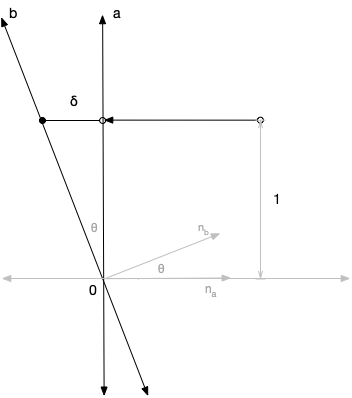|
Celeritas 0.7.0-dev.356+develop.6a0c715
|
|
Celeritas 0.7.0-dev.356+develop.6a0c715
|
Compare two surfaces for soft equality. More...
#include <SoftSurfaceEqual.hh>
Public Member Functions | |
| SoftSurfaceEqual (Tolerance<> const &tol) | |
| Construct with tolerance. | |
| SoftSurfaceEqual (real_type rel) | |
| Construct with relative tolerance only. | |
| SoftSurfaceEqual () | |
| Construct with default tolerance. | |
| template<Axis T> | |
| bool | operator() (PlaneAligned< T > const &, PlaneAligned< T > const &) const |
| Compare two aligned planes for near equality. | |
| template<Axis T> | |
| bool | operator() (CylCentered< T > const &, CylCentered< T > const &) const |
| Compare two centered axis-aligned cylinders for near equality. | |
| bool | operator() (SphereCentered const &, SphereCentered const &) const |
| Compare two centered spheres for near equality. | |
| template<Axis T> | |
| bool | operator() (CylAligned< T > const &, CylAligned< T > const &) const |
| Compare two aligned cylinders for near equality. | |
| bool | operator() (Plane const &, Plane const &) const |
| Compare two planes for near equality. | |
| bool | operator() (Sphere const &, Sphere const &) const |
| Compare two spheres for near equality. | |
| template<Axis T> | |
| bool | operator() (ConeAligned< T > const &, ConeAligned< T > const &) const |
| Compare two cones for near equality. | |
| bool | operator() (SimpleQuadric const &, SimpleQuadric const &) const |
| Compare two simple quadrics for near equality. | |
| bool | operator() (GeneralQuadric const &, GeneralQuadric const &) const |
| Compare two general quadrics for near equality. | |
| bool | operator() (Involute const &, Involute const &) const |
| Compare two centered involutes for near equality. | |
Compare two surfaces for soft equality.
Ideally, this would evaluate whether the Hausdorff distance between two surfaces, within some bounding box, is less than the tolerance.
| bool celeritas::SoftSurfaceEqual::operator() | ( | GeneralQuadric const & | a, |
| GeneralQuadric const & | b | ||
| ) | const |
Compare two general quadrics for near equality.
Compare two planes for near equality.
Consider two planes with normals a and b , without loss of generality where a is at \(x=0\) and b is in the xy plane. Suppose that to be equal, we want a intercept error of no more than \(\delta\) at a unit distance from the normal (since we're assuming the error is based on the length scale of the problem). Taking a ray from (1, 1) along (-1, 0), the distance to the plane with normal a is 1, and the distance to plane b is then \( 1 \pm \delta \). This results in a right triangle with legs of 1 and \( \delta \) and opening angle from the origin of \( \theta \), which is equal to the angle between the normals of the two planes. Thus we have:
\[ \tan \theta = \frac{\delta}{1} \]
and
\[ \cos \theta = a \cdot b \equiv \mu \;. \]
thus
\[ \mu = \frac{1}{\sqrt{1 + \delta^2}} \to \delta = \sqrt{\frac{1}{\mu^2} - 1} \]
so if we want to limit the intercept error to \( \epsilon \), then
\[ \sqrt{\frac{1}{\mu^2} - 1} < \epsilon \;. \]
and we also have to make sure the two planes are pointed into the same half-space by checking for \( \mu > 0 \).
Since this derivation is based on an absolute length scale of 1, the relative tolerance should be used.
Due to floating point arithmetic, \(mu\) can be slightly greater than unity, and since epsilon is often smaller than \(\sqrt{\epsilon_\mathrm{mach}}\) for single precision arithmetic, the comparison here adds an extra bump to account for the precision loss.

| bool celeritas::SoftSurfaceEqual::operator() | ( | SimpleQuadric const & | a, |
| SimpleQuadric const & | b | ||
| ) | const |
Compare two simple quadrics for near equality.
length not squared length. Then using a soft equivalence on each element would more or less work?